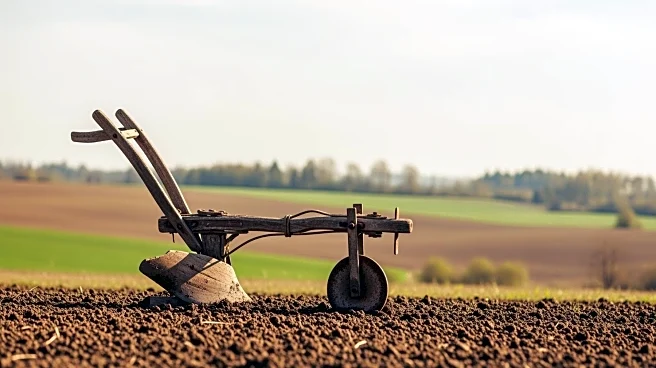What's Happening?
Agricultural experts are emphasizing the importance of fall tillage to prepare fields for the next planting season. According to CJ Parker, Case IH North America tillage marketing manager, fall tillage helps
manage residue and break up compaction layers, which are crucial for consistent moisture and temperature in spring. Daniel Stansbury, AgRevolution corporate service director, provides a checklist for farmers to ensure their equipment is in optimal condition, including inspecting for wear and tear and making necessary repairs. The use of vertical tillage tools is recommended for managing residue and incorporating organic matter and fertilizer into the soil. Technological advancements, such as Case IH SoilCommand and John Deere’s TruSet Active tillage technology, are also highlighted for their ability to automate and optimize the tillage process.
Why It's Important?
Fall tillage is critical for ensuring that fields are ready for spring planting, which can significantly impact crop yields. Proper residue management and soil preparation can prevent issues such as poor drainage and root penetration, which are detrimental to plant growth. By addressing these issues in the fall, farmers can avoid delays and repairs during the busy planting season, ultimately improving their bottom line. The integration of advanced technology in tillage equipment allows for more precise and efficient field preparation, reducing labor and time costs. This is particularly important as agricultural operations face increasing pressure to maximize productivity and sustainability.
What's Next?
Farmers are expected to continue adopting advanced tillage technologies to enhance their field preparation processes. As companies like Case IH and John Deere develop more sophisticated tools, the trend towards automation in agriculture is likely to grow. This shift could lead to increased efficiency and reduced labor costs, benefiting farmers financially. Additionally, as environmental concerns rise, the focus on sustainable farming practices, including effective residue management and soil health, will likely intensify. Farmers may also explore new tillage techniques and tools to adapt to changing climate conditions and soil types.
Beyond the Headlines
The move towards advanced tillage technology reflects a broader trend in agriculture towards precision farming, which aims to increase efficiency and sustainability. This shift has ethical and environmental implications, as it can lead to reduced chemical use and better resource management. However, it also raises questions about the accessibility of such technologies for smaller farms, which may not have the financial resources to invest in high-tech equipment. The industry may need to address these disparities to ensure that all farmers can benefit from technological advancements.








